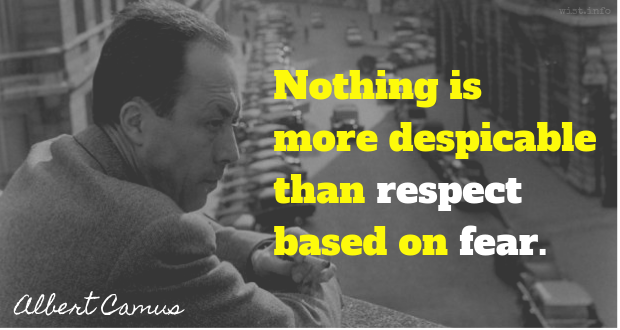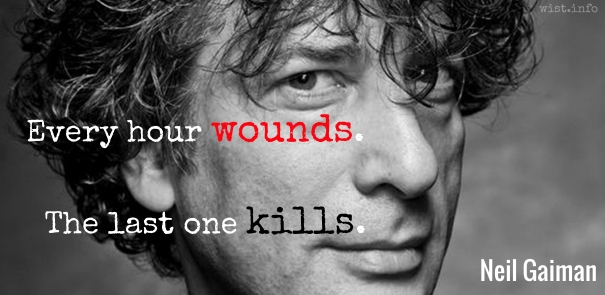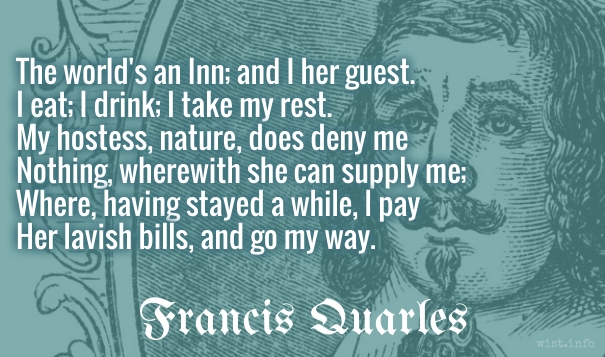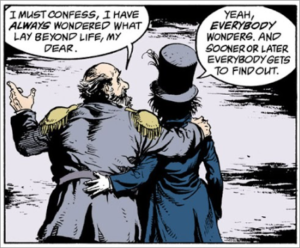All deaths are dour: the fate of men is sad; but there’s no death more miserable than the doom starvation sends.
[Πάντες μὲν στυγεροὶ θάνατοι δειλοῖσι βροτοῖσι,
λιμῷ δ’ οἴκτιστον θανέειν καὶ πότμον ἐπισπεῖν.]Homer (fl. 7th-8th C. BC) Greek author
The Odyssey [Ὀδύσσεια], Book 12, l. 341ff (12.341-342) [Eurylochus] (c. 700 BC) [tr. Mandelbaum (1990)]
(Source)
Urging is fellow sailors to slaughter the Sun God's cattle. That ends poorly.Original Greek. Alternate translations:
Hear what I shall say,
Though words will staunch no hunger, ev’ry death
To us poor wretches that draw temporal breath
You know is hateful; but, all know, to die
The death of Famine is a misery
Past all death loathsome.
[tr. Chapman (1616)]
Meantime Eurylochus bad counsel gives
To his companions. All deaths, quoth he,
Are hateful to what thing soever lives;
But death by hunger is the worst can be.
[tr. Hobbes (1675)]
O friends, a thousand ways frail mortals lead
To the cold tomb, and dreadful all to tread;
But dreadful most, when by a slow decay
Pale hunger wastes the manly strength away.
[tr. Pope (1725)]
Death, however caused,
Abhorrence moves in miserable man,
But death by famine is a fate of all
Most to be fear’d.
[tr. Cowper (1792)]
Friends, though to wretched men all deaths are dire,
Yet it is far most miserable to pine
With pangs of famine and for want expire.
[tr. Worsley (1861), st. 47]
Death is in all shapes to unhappy men
A fearful fate: but misery extreme
Were it our own destruction to provoke
And die of hunger.
[tr. Musgrave (1869), l. 515ff]
All deaths are hateful to us wretched mortals;
But death by famine is most pitiable.
[tr. Bigge-Wither (1869)]
Truly every shape of death is hateful to wretched mortals, but to die of hunger and so meet doom is most pitiful of all.
[tr. Butcher/Lang (1879)]
All manner of death is loathly to wretched men that die,
But to meet our fate by famine is to end most wretchedly.
[tr. Morris (1887)]
Hateful is every form of death to wretched mortals; and yet to die by hunger, and so to meet one's doom, is the most pitiful of all.
[tr. Palmer (1891)]
All deaths are bad enough, but there is none so bad as famine.
[tr. Butler (1898)]
All forms of death are hateful to wretched mortals, but to die of hunger, and so meet one's doom, is the most pitiful.
[tr. Murray (1919)]
No variety of death is pleasing to us poor mortals: but commend me to hunger and its slow perishing as the meanest fate of all.
[tr. Lawrence (1932)]
To us wretched men all forms of death are abominable, but death by starvation is the most miserable end that one can meet.
[tr. Rieu (1946)]
All deaths are hateful to us, mortal wretches, but famine is the most pitiful, the worst end that a man can come to.
[tr. Fitzgerald (1961)]
All deaths are detestable for wretched mortals,
but hunger is the sorriest way to die and encounter fate.
[tr. Lattimore (1965)]
All ways of dying are hateful to us poor mortals,
true, but to die of hunger, starve to death --
that's the worst of all.
[tr. Fagles (1996)]
Every manner of dying is hateful to miserable mortals,
but most wretched by hunger to die and encounter our doomsday.
[tr. Merrill (2002)]
To us wretched men all forms of death are abominable,
but death by starvation is the most miserable way to meet one's doom.
[tr. DCH Rieu (2002)]
All ways of dying are hateful to wretched mortals, but the most miserable way to meet one's doom is by hunger.
[tr. Verity (2016)]
All human deaths are hard to bear. But starving is most miserable of all.
[tr. Wilson (2017)]
All kinds of death are loathsome to wretched mortals,
but to die of starvation -- that's the most pitiful of fates!
[tr. Green (2018)]
For wretched human beings
all forms of death are hateful. But to die
from lack of food, to meet one’s fate like that,
is worst of all. [tr. Johnston (2019), l. 445ff]
Quotations about:
mortality
Note not all quotations have been tagged, so Search may find additional quotes on this topic.
And speech he has learned, and thought
So swift, and the temper of mind
To dwell within cities, and not to lie bare
Amid the keen, biting frosts
Or cower beneath pelting rain;
Full of resource against all that comes to him
is Man. Against Death alone
He is left with no defence.[καὶ φθέγμα καὶ ἀνεμόεν φρόνημα καὶ ἀστυνόμους
ὀργὰς ἐδιδάξατο καὶ δυσαύλων
πάγων ὑπαίθρεια καὶ δύσομβρα φεύγειν βέλη
παντοπόρος: ἄπορος ἐπ᾽ οὐδὲν ἔρχεται
τὸ μέλλον: Ἅιδα μόνον φεῦξιν οὐκ ἐπάξεται.]Sophocles (496-406 BC) Greek tragic playwright
Antigone, l. 354ff, Stasimon 1, Strophe 2 [Chorus] (441 BC) [tr. Kitto (1962)]
(Source)
Original Greek. Alternate translations:
Language and lofty thought,
And dispositions meet for order'd cities,
These he hath taught himself; -- and how to shun
The shafts of comfortless winter, --
Both those which smite when the sky is clear,
And those which fall in showers; --
with plans for all things,
Planless in nothing, meets he the future!
Of death alone the avoidance
No foreign aid will bring.
[tr. Donaldson (1848)]
Speech and the wind-swift speed of counsel and civic wit,
He hath learnt for himself all these; and the arrowy rain to fly
And the nipping airs that freeze, 'neath the open winter sky.
He hath provision for all: fell plague he hath learnt to endure;
Safe whate'er may befall: yet for death he hath found no cure.
[tr. Storr (1859)]
Wise utterance and wind-swift thought, and city-moulding mind,
And shelter from the clear-eyed power of biting frost,
He hath taught him, and to shun the sharp, roof-penetrating rain, --
Full of resource, without device he meets no coming time;
From Death alone he shall not find reprieve;
No league may gain him that relief.
[tr. Campbell (1873)]
Speech and thought fast as the wind and the moods that give order to a city he has taught himself, and how to flee the arrows of the inhospitable frost under clear skies and the arrows of the storming rain. He has resource for everything. Lacking resource in nothing he strides towards what must come. From Death alone he shall procure no escape.
[tr. Jebb (1891)]
And speech, and wind-swift thought, and all the moods that mould a state, hath he taught himself; and how to flee the arrows of the frost, when 'tis hard lodging under the clear sky, and the arrows of the rushing rain; yea, he hath resource for all; without resource he meets nothing that must come: only against Death shall he call for aid in vain.
[tr. Jebb (1917)]
Words also, and thought as rapid as air,
He fashions to his good use; statecraft is his,
And his the skill that deflects the arrows of snow,
The spears of winter rain: from every wind
He has made himself secure -- from all but one:
In the late wind of death he cannot stand.
[tr. Fitts/Fitzgerald (1939)]
The use of language, the wind-swift motion of brain
He learnt; found out the laws of living together
In cities, building him shelter against the rain
And wintry weather.
There is nothing beyond his power. His subtlety
Meeteth all chance, all danger conquereth.
For every ill he hath found its remedy,
Save only death.
[tr. Watling (1947), l. 295ff]
Language, and thought like the wind
and the feelings that make the town,
he has taught himself, and shelter against the cold,
refuge from rain. He can always help himself.
He faces no future helpless. There's only death
that he cannot find an escape from.
[tr. Wyckoff (1954)]
And speech and thought, quick as the wind
and the mood and mind for law that rules the city --
all these he has taught himself
and shelter from the arrows of the frost
when there's rough lodging under the cold clear sky
and the shafts of lashing rain --
ready, resourceful man!
Never without resources
never an impasse as he marches on the future --
only Death, from Death alone he will find no rescue.
[tr. Fagles (1982)]
Language and a mind swift as the wind
For making plans --
These he has taught himself --
And the character to live in cities under law.
He's learned to take cover from a frost
And escape sharp arrows of sleet.
He has the means to handle every need,
Never steps toward the future without the means.
Except for Death: He's got no relief from that.
[tr. Woodruff (2001)]
Both language and thought swift as wind
and impulses that govern cities,
he has taught himself, as well as how
to escape the shafts of rain
while encamped beneath open skies.
All resourceful, he approaches no future thing
to come without resource. From Hades alone
he will not contrive escape.
[tr. Tyrell/Bennett (2002)]
And man has learnt speech and thought, swifter than the wind he mastered
And learnt to govern his cities well
And this omniscient being has learnt how to avoid the blasts of the wild open air: the arrows of the freezing night, the dreadful wind driven piercing gale!
He’s prepared for all events bar Death and from Death he can find no escape.
[tr. Theodoridis (2004)]
He’s taught himself speech and wind-swift thought,
trained his feelings for communal civic life,
learning to escape the icy shafts of frost,
volleys of pelting rain in winter storms,
the harsh life lived under the open sky.
That’s man -- so resourceful in all he does.
There’s no event his skill cannot confront --
other than death -- that alone he cannot shun.
[tr. Johnston (2005), l. 405ff]
He taught himself language and wind-like thought and city-ruling urges, how to flee the slings of frost under winter's clear sky and the arrows of stormy rain, ever-resourceful. Against no possibility is he at a loss. For death alone he finds no aid.
[tr. Thomas (2005)]
The best break anybody ever gets is in bein’ alive in the first place. An’ you don’t unnerstan’ what a perfect deal it is until you realizes that you ain’t gone be stuck with it forever, either.
Therefore, when the young die I am reminded of a strong flame extinguished by a torrent; but when old men die it is as if a fire had gone out without the use of force and of its own accord, after the fuel had been consumed; and, just as apples when they are green are with difficulty plucked from the tree, but when ripe and mellow fall of themselves, so, with the young, death comes as a result of force, while with the old it is the result of ripeness. To me, indeed, the thought of this “ripeness” for death is so pleasant, that the nearer I approach death the more I feel like one who is in sight of land at last and is about to anchor in his home port after a long voyage.
[Itaque adulescentes mihi mori sic videntur, ut cum aquae multitudine flammae vis opprimitur, senes autem sic, ut cum sua sponte nulla adhibita vi consumptus ignis exstinguitur; et quasi poma ex arboribus, cruda si sunt, vix evelluntur, si matura et cocta, decidunt, sic vitam adulescentibus vis aufert, senibus maturitas; quae quidem mihi tam iucunda est, ut, quo propius ad mortem accedam, quasi terram videre videar aliquandoque in portum ex longa navigatione esse venturus.]
Marcus Tullius Cicero (106-43 BC) Roman orator, statesman, philosopher
De Senectute [Cato Maior; On Old Age], ch. 19 / sec. 71 (19.71) (44 BC) [tr. Falconer (1923)]
(Source)
(Source (Latin)). Alternate translations:
And by that the adolescentes & yong men as me semyth dyen like as old men which quencheth a strong & a right grete fflame of fyre by castyng in of moche watir, and olde men dyen as a fyre which stynteth and wasteth itself or as a candel & the matche in a lampe of oyle consumith withoute doyng violence & withoute any force & strength. I make eftsonys anothir comparison of deth whiche comyth both to yong & olde men ffor as the appils & othir fruytes hangyng on the trees be by force plucked in the meanetyme whiles they be rawe & newe & when they be ripe & melowe by the heete of the sonne they fallen of with their free & playne will & so the deth takith awey by hir violente force the life of yong men and the ripnesse of olde age takith awey the life of olde men softely and withoute force. And this deth whiche comith by ripnesse of long age is so ioyfull and so agreable to me in so moche as I shall applye and come more nygh to it in a convenient season. The deth is also to me noon othirwise ioyfull or agreable than shuld be to me the deye londe if me thought that I shulde see it when I seyle in a ship or swymme in the see to the porte or havyn. And that it were likly that I shuld come to the porte or havyn aftir that I have sey∣led and vyaged long upon the see. That is to witt that deth which comith to the wise man aftir long age is like the porte or haven that men see from ferr in seylyng upon the see whiche doth grete ioye when men be upon the river into the haven warde and to have takyn their porte salve ffor the drede of the parelles and dangers of rokkes sandys and grete tempestys be than passid chaungid and turned in saftee and rest.
[tr. Worcester/Worcester/Scrope (1481)]
Therefore, young men, in mine opinion, seem so to die as when a raging and violent flame of fire is quenched, with a great quantity or effusion of water; but old men die as if it were fire, which, lacking wood and cumbustible matter to nourish it, goeth out quietly and is quenched, as though it were of his own accord, not forcibly. And as apples which are green and unripe are not plucked from the tree but by a certain violent plucking, but if they be ripe and mellow they fall voluntarily down from teh tree; so likewise, young men depart out of their life by violent force and painful struggling, but old men die by a certain ripeness and maturity. And as often as I think thereon, I am rapt with such joy and comfort, that the nearer I draw and approach to death, the sooner, methink, I see the dry land, and (as it were, afer a long navigation and seafaring voyage) shall at length arrive at the quiet haven ahd port of all rest and security.
[tr. Newton (1569)]
Therefore a young man seemeth to me to die like fire put out with water, but old men like fire which being put out by no force, is quietly consumed of it selfe; and as apples on trees being not ripe, are plucked of by violence, but being ripe they fall of themselves: so force taketh away the life of young men, but ripenesse of age the life of old men: which consideration is so pleasant to me, that I seem to behold the earth, as a quiet port, whither after a long and troublesome navigation I shall arrive.
[tr. Austin (1648), ch. 21]
All things which Nature did ordain, are good,
And so must be receiv'd, and understood,
Age, like ripe Apples, on earth's bosom drops,
Whil'st force our youth, like fruits untimely crops;
The sparkling flame of our warm blood expires,
As when huge streams are pour'd on raging fires,
But age unforc'd falls by her own consent,
As Coals to ashes, when the Spirit's spent;
Therefore to death I with such joy resort,
As Seamen from a Tempest to their Port.
[tr. Denham (1669)]
For this Reason, I think it not so improper, to compare the Death of Youth to Flames extinguished, by a violent and suddain Splash of Water; and that of Riper Years, to such a Fire, as without any Violence, goes out, when all its Fewel is decayed and spent. And as Fruit, when it is green, is torn and plucked with Violence from the Boughs, which, when become more ripe and mellow, falls gently of it self: so Youth departs this Life with Violent Strugles, while Old Age drops off mature with Years. And indeed the Prospect of this is so far from being unpleasant, that the nearer it is, the more delightful does it seem: nor is it less grateful, than the Sight of land can be to one, quite tired with a long and tedious Voyage.
[tr. Hemming (1716)]
Thus the Youthful seem, I think, to die like Fire forcibly quench'd with Water, whereas the Aged go smoothly off, and like the Fire burnt to the last Spark, need no Force to be extinguished; or as green Fruit which must be plucked from the Trees, but when ripe falls off it self. Thus do the Young die with Repugnancy, and the Old fall with Maturity. So that Life becomes the pleasanter to me, the nearer I approach its End, thinking to myself the Earth is my Harbour, into which I shall arrive, after a long and tedious Voyage.
[tr. J. D. (1744)]
For Young Men seem to be forced from Life, as Fires are extinguished by great Quantities of Water thrown on them; when on the contrary, Old Men expire of themselves, like a Flame when all its Fuel is spent. And as unripe Fruit requires some Force to part it from its native Bough; but when come to full Maturity, it drops of itself, without any Hand to touch it: So Young People die by something violent or unnatural; but the Old by mere Ripeness. The Thoughts of which to me are now become so agreeable, that the nearer I draw to my End, it seems like discovering the Land at Sea, that, after the Tossings of a tedious and stormy Voyage, will yield me a safe and quiet Harbour.
[tr. Logan (1744)]
In the latter instance [youth]; the privation of life may be resembled to a fire forcibly extinguished by a deluge of water; in the former [an old man], to a fire spontaneously and gradually going out from a total consumption of its fuel. Or, to have recourse to another illustration; as fruit before it is ripe cannot, without some degree of force, be separated from the stalk, but drops of itself when perfectly mature; so the disunion of the soul and body is effected in the young by dint of violence, but is wrought in the old by a mere fullness and completion of years. This ripeness for death I perceive in myself with much satisfaction; and I look forward to my dissolution as to a secure haven, where I shall at length find a happy repose from the fatigues of a long voyage.
[tr. Melmoth (1773)]
Therefore young men seem to me to die just as when the force of flame is suddenly overpowered by a mass of water; but old men, just as fire that is spent is extinguished of itself, no violence having been applied to it. And, as apples are pulled from trees by force, if they are unripe; if ripe and mellowed, they fall down; so force takes away life from young men, maturity from old men; which maturity to me, indeed, is so pleasant, that the nearer I approach to death, I seem, as it were, to behold land, and to be about to come, at length, into port form a long voyage.
[Cornish Bros. ed. (1847)]
And thus it is that young men seem to me to die, just as when the violence of flame is extinguished by a flood of water; whereas old men die, as the exhausted fire goes out, spontaneously, without the exertion of any force: and as fruits when they are green are plucked by force from the trees, but when ripe and mellow drop off, so violence takes away their lives from youths, maturity from old men; a state which to me indeed is so delightful, that the nearer I approach to death, I seem as it were to be getting sight of land, and at length, after a long voyage, to be just coming into harbour.
[tr. Edmonds (1874)]
Thus young men seem to me to die as when a fierce flame is extinguished by a stream of water; while old men die as when a spent fire goes out of its own accord, without force employed to quench it. Or, as apples, if unripe, are violently wrenched from the tree, while, mature and ripened, they fall, so force takes life from the young, maturity from the old; and this ripeness of old age is to me so pleasant, that, in proportion as I draw near to death, I seem to see land, and after a long voyage to be on the point of entering the harbor.
[tr. Peabody (1884)]
Accordingly, the death of young men seems to me like putting out a great fire with a deluge of water; but old men die like a fire going out because it has burnt down of its own nature without artificial means. Again, just as apples when unripe are torn from trees, but when ripe and mellow drop down, so it is violence that takes life from young men, ripeness from old. This ripeness is so delightful to me, that, as I approach nearer to death, I seem as it were to be sighting land, and to be coming to port at last after a long voyage.
[tr. Shuckburgh (1895)]
The death of the young seems to me to resemble the sudden extinction of a flame with volumes of water; the old seem rather to die as a fire which flickers out of itself.
[ed. Harbottle (1906)]
To them it comes
It seems to me, as when a fire is quenched
By streams of water: to the old it comes
As when a fire dies slowly down itself:
Just so the apples, when unripe, are torn
With violence from the boughs: if ripe with age
They gently fall: and so the life of youth
Is taken by some violent attack;
The old man's troublous age comes gently to an end.
To me this seems so pleasant, that I feel
The nearer that I draw towards the end,
I sight the land, and see before my eyes
The harbour waiting to receive the bark
Which long as voyaged on the toilsome sea.
[tr. Allison (1916)]
It seems to me that the death of a young man is like the drowning of a blazing flame by a flood of water, whereas the death of the old is like the gradual, utterly gentle and spontaneous flickering out of a fire that has used up its fuel. Fruits, too, if they are green, must be forcefully pulled from the bough, but if they are ripe and mellow, they drop off. So it is with the life of man: from the young, it is taken by violence, from the old, by the fullness of time. This is a thought that gives me great comfort; as I come closer and closer to death, I seem, so to speak, to see the land and to be at last about to come into harbor after a long sea-journey.
[tr. Copley (1967)]
Death at an early age seems to me like a fire that has suddenly been swamped by a bucket of water; but death in old age is like a fire that has not been extinguished but has gone out of its own accord, because it has used up all its fuel. When an apple is not yet ripe, it takes some work to tug it off the branch; but when it is fully ripe, it simply falls to the ground. In the same way, though some act of violence may snatch life from the young, the old are ready to die. And that to me is a pleasant thought -- so much so that the nearer I get to death, the more I feel like a sailor who, after a long voyage, has made landfall and is about to tie up in his home port.
[tr. Cobbold (2012)]
When a young person dies, it seems to me to be like a vigorous flame being put out by a fire hose; with old people, on the other hand, the flame is extinguished, having burned itself out on its own accord with no violent outside force. When unripe apples are plucked from trees it takes real force, but the mature and mellow ones fall gently and naturally. Violence carries life away from the young, from the old it is ripeness. And, you know, the ripeness is so pleasant to me that the nearer I approach death, the more I see it as land and that at last I am about to come into port after a long voyage.
[tr. Gerberding (2014)]
Therefore young people, it seems to me, pass
Away like tall flames put out by a large mass
Of water while old men die out like the fumes
Of an unquenchable fire which consumes
Itself without recourse to another force.
And just as unripe fruits are hard to pluck
From the trees to which they’re closely stuck,
But once mature and fully grown
Drop down to the ground on their own,
So young lives are cut down by ferocity
While old ones are spent by maturity.
A maturity to me so suave
The nearer I get to the grave.
It also seems to me as though
I were almost shouting land-ho!
On reaching the port of destination
After a very long navigation.
[tr. Bozzi (2015)]
A young person dying reminds me of a fire extinguished by a deluge. But when an old person dies, it is like a flame that diminishes gradually and flickers away of its own accord with no force applied after its fuel has been used up. In the same way, green apples are hard to pick from a tree, but when ripe and ready they fall to the ground by themselves. So death comes to the young with force, but to the old when the time is right. To me there is great comfort in this idea, so that as death grows nearer, the more I feel like a traveler who at last sees the land of his home port after a long voyage.
[tr. Freeman (2016)]
Ah my friend, if you and I could escape this fray
and live forever, never a trace of age, immortal,
I would never fight on the front lines again
or command you to the field where men win fame.
But now, as it is, the fates of death await us,
thousands poised to strike, and not a man alive
can flee them or escape — so in we go for attack!
Give our enemy glory or win it for ourselves![Ὦ πέπον εἰ μὲν γὰρ πόλεμον περὶ τόνδε φυγόντε
αἰεὶ δὴ μέλλοιμεν ἀγήρω τ’ ἀθανάτω τε
ἔσσεσθ’, οὔτέ κεν αὐτὸς ἐνὶ πρώτοισι μαχοίμην
οὔτέ κε σὲ στέλλοιμι μάχην ἐς κυδιάνειραν·
νῦν δ’ ἔμπης γὰρ κῆρες ἐφεστᾶσιν θανάτοιο
μυρίαι, ἃς οὐκ ἔστι φυγεῖν βροτὸν οὐδ’ ὑπαλύξαι,
ἴομεν ἠέ τῳ εὖχος ὀρέξομεν ἠέ τις ἡμῖν.]Homer (fl. 7th-8th C. BC) Greek author
The Iliad [Ἰλιάς], Book 12, l. 322ff (12.322-328) [Sarpedon to Glaukos] (c. 750 BC) [tr. Fagles (1990), ll. 374-81]
Original Greek. Alt. trans.:
O friend, if keeping back
Would keep back age from us, and death, and that we might not wrack
In this life’s human sea at all, but that deferring now
We shunn’d death ever, nor would I half this vain valour show,
Nor glorify a folly so, to wish thee to advance;
But since we must go, though not here, and that, besides the chance
Propos’d now, there are infinite fates of other sort in death,
Which, neither to be fled nor ’scap’d, a man must sink beneath,
Come, try we, if this sort be ours, and either render thus
Glory to others, or make them resign the like to us.
[tr. Chapman (1611), ll. 323-33]
Could all our care elude the gloomy grave,
Which claims no less the fearful than the brave,
For lust of fame I should not vainly dare
In fighting fields, nor urge thy soul to war;
But since, alas! ignoble age must come,
Disease, and death's inexorable doom;
The life which others pay, let us bestow,
And give to fame what we to nature owe;
Brave though we fall, and honoured if we live,
Or let us glory gain, or glory give!
[tr. Pope (1715-20)]
Oh Glaucus, if escaping safe the death
That threats us here, we also could escape
Old age, and to ourselves secure a life
Immortal, I would neither in the van
Myself expose, nor would encourage thee
To tempt the perils of the glorious field.
But since a thousand messengers of fate
Pursue us close, and man is born to die --
E’en let us on; the prize of glory yield,
If yield we must, or wrest it from the foe.
[tr. Cowper (1791), ll. 389-98]
O dear friend, if indeed, by escaping from this war, we were destined to be ever free from old age, and immortal, neither would I combat myself in the van, nor send thee into the glorious battle. But now -- for of a truth ten thousand Fates of death press upon us, which it is not possible for a mortal to escape or avoid -- let us on: either we shall give glory to some one, or some one to us.
[tr. Buckley (1860)]
O friend! if we, survivors of this war,
Could live, from age and death for ever free,
Thou shouldst not see me foremost in the fight,
Nor would I urge thee to the glorious field:
But since on man ten thousand forms of death
Attend, which none may ’scape, then on, that we
May glory on others gain, or they on us!
[tr. Derby (1864)]
Ah, friend, if once escaped from this battle we were for ever to be ageless and immortal, neither would I fight myself in the foremost ranks, nor would I send thee into the war that giveth men renown, but now -- for assuredly ten thousand fates of death do every way beset us, and these no mortal may escape nor avoid -- now let us go forward, whether we shall give glory to other men, or others to us.
[tr. Leaf/Lang/Myers (1891)]
My good friend, if, when we were once out of this fight, we could escape old age and death thenceforward and for ever, I should neither press forward myself nor bid you do so, but death in ten thousand shapes hangs ever over our heads, and no man can elude him; therefore let us go forward and either win glory for ourselves, or yield it to another.
[tr. Butler (1898)]
Ah friend, if once escaped from this battle we were for ever to be ageless and immortal, neither should I fight myself amid the foremost, nor should I send thee into battle where men win glory; but now -- for in any case fates of death beset us, fates past counting, which no mortal may escape or avoid -- now let us go forward, whether we shall give glory to another, or another to us.
[tr. Murray (1924)]
Man, supposing you and I, escaping this battle,
would be able to live on forever, ageless, immortal,
so neither would I myself go on fighting in the foremost,
nor would I urge you into the fighting where men win glory.
But now, seeing that the spirits of death stand close about us
in their thousands, no man can turn aside or escape them,
let us go on and win glory for ourselves, or yield it to others.
[tr. Lattimore (1951)]
But now a thousand shapes of death surround us,
and no man can escape the, or be safe. Let us attack --
whether to give some fellow glory or to win it from him.
[tr. Fitzgerald (1974)]
You are neither the first nor the last of mortals
to lose a good wife. You have to learn
that death is a debt we all must pay.[οὐ γάρ τι πρῶτος οὐδὲ λοίσθιος βροτῶν
γυναικὸς ἐσθλῆς ἤμπλακες· γίγνωσκε δὲ
ὡς πᾶσιν ἡμῖν κατθανεῖν ὀφείλεται.]Euripides (485?-406? BC) Greek tragic dramatist
Alcestis [Ἄλκηστις], c. l. 415 [Chorus] (438 BC) [tr. Leuschnig]
(Source)
Alt. trans.:
Thou art by no means the first nor yet shalt be the last of men to lose a wife of worth; know this, we all of us are debtors unto death.
[tr. Coleridge (1910)]
Thou shalt not be the last, nor yet the first,
To lose a noble wife. Be brave, and know
To die is but a debt that all men owe.
[tr. Murray (1915)]
Not first of mortals thou, nor shalt be last
To lose a noble wife; and, be thou sure,
From us, from all, this debt is due -- to die.
[tr. Way (1984)]
You are neither the first nor the last mortal
Who has lost a good wife. Understand this:
Dying is a debt we all have to pay.
[tr. @sentantiq (2020)]
As is the generation of leaves, so is that of humanity.
The wind scatters the leaves on the ground, but the live timber
Burgeons with leaves again in the season of spring returning.
So one generation of men will grow while another dies.[Οἵη περ φύλλων γενεὴ τοίη δὲ καὶ ἀνδρῶν.
φύλλα τὰ μέν τ’ ἄνεμος χαμάδις χέει, ἄλλα δέ θ’ ὕλη
τηλεθόωσα φύει, ἔαρος δ’ ἐπιγίγνεται ὥρη·
ὣς ἀνδρῶν γενεὴ ἣ μὲν φύει ἣ δ’ ἀπολήγει.]Homer (fl. 7th-8th C. BC) Greek author
The Iliad [Ἰλιάς], Book 6, l. 146ff (6.146-149) (c. 750 BC) [tr. Lattimore (1951)]
(Source)
Like the race of leaves
The race of man is, that deserves no question; nor receives
My being any other breath? The wind in autumn strows
The earth with old leaves, then the spring the woods with new endows;
And so death scatters men on earth, so life puts out again
Man’s leavy issue.
[tr. Chapman (1611), l. 141ff]
Like leaves on trees the race of man is found,
Now green in youth, now withering on the ground:
Another race the following spring supplies,
They fall successive, and successive rise:
So generations in their course decay;
So flourish these, when those are past away.
[tr. Pope (1715-20)]
For, as the leaves, such is the race of man.
The wind shakes down the leaves, the budding grove
Soon teems with others, and in spring they grow.
So pass mankind. One generation meets
Its destined period, and a new succeeds.
[tr. Cowper (1791), l. 175ff]
As is the race of leaves, even such is the race of men. Some leaves the wind sheds upon the ground, but the fructifying wood produces others, and these grow up in the season of spring. Such is the generation of men; one produces, another ceases.
[tr. Buckley (1860)]
The race of man is as the race of leaves:
Of leaves, one generation by the wind
Is scatter'd on the earth; another soon
In spring's luxuriant verdure bursts to light.
So with our race; these flourish, those decay.
[tr. Derby (1864)]
Even as are the generations of leaves such are those likewise of men; the leaves that be the wind scattereth on the earth, and the forest buddeth and putteth forth more again, when the season of spring is at hand; so of the generations of men one putteth forth and another ceaseth.
[tr. Leaf/Lang/Myers (1891)]
Men come and go as leaves year by year upon the trees. Those of autumn the wind sheds upon the ground, but when spring returns the forest buds forth with fresh vines. Even so is it with the generations of mankind, the new spring up as the old are passing away.
[tr. Butler (1898)]
Even as are the generations of leaves, such are those also of men. As for the leaves, the wind scattereth some upon the earth, but the forest, as it bourgeons, putteth forth others when the season of spring is come; even so of men one generation springeth up and another passeth away.
[tr. Murray (1924)]
Very like leaves upon this earth are the generations of men -- old leaves, cast on the ground by wind, young leaves the greening forest bears when spring comes in. So mortals pass; one generation flowers even as another dies away.
[tr. Fitzgerald (1974)]
Like the generations of leaves, the lives of mortal men.
Now the wind scatters the old leaves across the earth,
now the living timber bursts with the new buds
and spring comes round again. And so with men:
as one generation comes to life, another dies away.
[tr. Fagles (1990), ll. 171-75]
This is your life, and it’s ending one minute at a time.
Chuck Palahniuk (b. 1962) American novelist and freelance journalist
Fight Club, ch. 3 (1996)
(Source)
It costs me never a stab nor squirm
To tread by chance upon a worm.
“Aha, my little dear,” I say,
“Your clan will pay me back some day.”Dorothy Parker (1893-1967) American writer
“Thoughts for a Sunshiny Morning,” New Yorker (3 Apr 1927)
(Source)
Reprinted in Sunset Gun (1927).
Life is so sweet! One can die but once, and it is for such a long time!
[Il est si doux de vivre: On ne meurt qu’une fois; et c’est pour si long-tems (longtemps)!]
Molière (1622-1673) French playwright, actor [stage name for Jean-Baptiste Poquelin]
The Love-Tiff [Le Dépit Amoureux], Act 5, sc. 4 (1656) [tr. Van Laun (1875)]
(Source)
Alt. trans.: "Life is so sweet! We die only once, and for such a long time!" [Lovers' Quarrels, tr. Wall (1879)]
Original French text.
The world is not respectable; it is mortal, tormented, confused, deluded forever; but it is shot through with beauty, with love, with glints of courage and laughter; and in these, the spirit blooms timidly, and struggles to be a light amid the thorns.
George Santayana (1863-1952) Spanish-American poet and philosopher [Jorge Agustín Nicolás Ruíz de Santayana y Borrás]
Platonism and the Spiritual Life (1927)
(Source)
Then out spake brave Horatius,
The Captain of the Gate:
“To every man upon this earth
Death cometh soon or late.
And how can man die better
Than facing fearful odds,
For the ashes of his fathers,
And the temples of his Gods?Thomas Babington Macaulay (1800-1859) English writer and politician
“Horatius,” st. 27, Lays of Ancient Rome (1842)
(Source)
How surely are the dead beyond death. Death is what the living carry with them. A state of dread, like some uncanny foretaste of a bitter memory. But the dead do not remember and nothingness is not a curse. Far from it.
Do I seem to say, “Let us eat and drink, for to-morrow we die?” Far from it; on the contrary, I say, “Let us take hands and help, for this day we are alive together.”
William Kingdon Clifford (1845-1879) English mathematician and philosopher
“The First and the Last Catastrophe,” Popular Science Monthly (Jul 1875)
(Source)
Always struck by the “comical” aspect of everything in Algeria connected with death. I find nothing more justified. Impossible to exaggerate the ridiculous quality of an event that is normally accompanied by sweat and gurgling. Similarly, it could not be too far demoted from the sacred status normally attributed to it. Nothing is more despicable than respect based on fear. And from this point of view, death is no more worthy of respect than Nero or the inspector at my local police station.
Albert Camus (1913-1960) Algerian-French novelist, essayist, playwright
Notebooks: 1935-1942, Notebook 3, Nov 1939 [tr. Thody (1963)]
(Source)
To live in this world
you must be able
to do three things:
to love what is mortal;
to hold itagainst your bones knowing
your own life depends on it;
and, when the time comes to let it go,
to let it go.
Yet soft, my books, no haste, nor hurry fate;
If fame must wait on death, then let it wait.[Vos tamen o nostri ne festinate libelli:
Si post fata venit gloria, non propero.]Martial (AD c.39-c.103) Spanish Roman poet, satirist, epigrammatist [Marcus Valerius Martialis]
Epigrams [Epigrammata], Book 5, epigram 10 (5.10.11-12) (AD 90) [tr. Pott & Wright (1921)]
(Source)
Compare to Epigram 1.25.
"To Regulus." (Source (Latin)). Alternate translations:
But haste not you (my Bookes) for Fame, to whom
Tis soone enough if after death it come.
[tr. May (1629)]
Let others to the Printing Presse run fast.
Since after death comes glory, Ile not haste.
[tr. Herrick (1648)]
O my small books, ne'er hasten to go out:
If praise come after death, I'll not go on.
[tr. Fletcher (1656)]
Yet you (my Bookes!) hast not to much, I pray:
If fame come not till after death, I'll stay.
[British Library MS Add. 27343]
With patience then, my Muse, to glory hy:
If after death she come, I shall not dy.
[tr. Elphinston (1782), 3.62]
Do not, however, you little books of mine, be in haste for fame:
if glory comes only after death, I am in no hurry for it.
[tr. Bohn's Classical (1859)]
If I gain fame after my death, I am content to wait.
[tr. Paley/Stone (1890), ep. 221]
Therefore, little books of mine,
Haste not; if glory comes but after death,
I'll wait awhile for glory.
[ed. Harbottle (1897)]
Pray, my impatient Muse, don't worry.
If death's due first, I'm in no hurry.
[tr. Francis & Tatum (1924), ep. 221]
Impatient little books of verse
For the plaudits of the universe,
If fame comes only after death,
Let's pause and rest, and catch our breath.
[tr. Marcellino (1968)]
But there's no cause, my little books, to worry:
If glory must be posthumous, why hurry?
[tr. Michie (1972)]
So, little books, let's not rush to our fate.
Since death comes before glory, let's be late.
[tr. Matthews (1992)]
So be calm, my Muse -- no need to rush or fret:
If death must precede fame, I'll not be famous yet.
[tr. Ericsson (1995)]
If I must die to get my fame,
I gladly will put off the same.
[tr. Wills (2007)]
Then be content, my books, to be slow paced;
Death before glory means -- no need for haste.
[tr. Pitt-Kethley (2008)]
But you, my little books, don’t hurry:
if glory comes only after death, I will not rush.
[tr. Robinson (2022)]
If glory comes after death, I hurry not.
[tr. Rush]
Dying is an art.
Like everything else,
I do it exceptionally well.
I do it so it feels like hell.
I do it so it feels real.
I guess you could say I have a call.
When you are twenty years old, you will be a peacock; at thirty, a lion; at forty, a camel; at fifty, a serpent; at sixty, a dog; at seventy, a monkey; and at eighty, nothing..
[A los veinte años será pavón; a los treinta, león; a los cuarenta, camello; a los cincuenta, serpiente; a los sesenta, perro; a los setenta, mona; y a los ochenta, nada.]
Baltasar Gracián y Morales (1601-1658) Spanish Jesuit priest, writer, philosopher
The Art of Worldly Wisdom [Oráculo Manual y Arte de Prudencia], § 276 (1647) [tr. Maurer (1992)]
(Source)
(Source (Spanish)). Alternate translations:
At twenty years of age a Peacock; at thirty a Lion; at fourty a Camel; at fifty a Serpent; at sixty a Dog; at seventy an Ape; at fourscore nothing at all.
[Flesher ed. (1685)]
At twenty a man is a Peacock, at thirty a Lion, at forty a Camel, at fifty a Serpent, at sixty a Dog, at seventy an Ape, at eighty nothing.
[tr. Jacobs (1892)]
At twenty, man is a peacock, at thirty a lion, at forty a camel, at fifty a snake, at sixty a dog, at seventy an ape, and at eighty, nothing.
[tr. Fischer (1937)]
The King in a carriage may ride,
And the Beggar may crawl at his side;
But in the general race,
They are traveling all the same pace.Edward FitzGerald (1809-1883) English writer, poet, translator
“Chronomoros,” l. 57ff, Chambers’s Edinburgh Journal (5 Dec 1840)
(Source)
It was later that the story of Windle Poons really came to an end, if “story” means all that he did and caused and set in motion. In the Ramtop village where they dance the real Morris dance, for example, they believe that no one is finally dead until the ripples they cause in the world die away — until the clock he wound up winds down, until the wine she made has finished its ferment, until the crop they planted is harvested. The span of someone’s life, they say, is only the core of their actual existence.
Every hour wounds. The last one kills.
Neil Gaiman (b. 1960) British author, screenwriter, fabulist
American Gods, epigraph (2001)
(Source)
Gaiman notes this as an "old saying." It is frequently found on sun dials or other clocks, sometimes in Latin. Variations:
- "All hours wound; the last one kills."
- "All the hours wound you, the last one kills."
- "They all wound; the last one kills."
- "Vulnerant omnes, ultima necat."
- "Omnes vulnerant. Postuma necat."
In our brief national history, we have shot four of our presidents, worried five of them to death, impeached one and hounded another out of office. And when all else fails, we hold an election and assassinate their characters.
GUIDERIUS: Fear no more the heat o’ the sun,
Nor the furious winter’s rages;
Thou thy worldly task hast done,
Home art gone, and ta’en thy wages:
Golden lads and girls all must,
As chimney-sweepers, come to dust.
William Shakespeare (1564-1616) English dramatist and poet
Cymbeline, Act 3, sc. 2, l. 331ff (3.2.331-336) (1611)
(Source)
An occasional glance at the obituary column of The Times has suggested to me that the sixties are very unhealthy; I have long thought that it would exasperate me to die before I had written this book, and so it seemed to me that I had better set about it at once. When I have finished it I can face the future with serenity, for I shall have rounded off my life’s work.
In youth, the years stretch before one so long that it is hard to realize that they will ever pass, and even in middle age, with the ordinary expectation of life in these days, it is easy to find excuses for delaying what one would like to do but does not want to; but at last a time comes when death must be considered.
The world’s an Inn; and I her guest.
I eat; I drink; I take my rest.
My hostess, nature, does deny me
Nothing, wherewith she can supply me;
Where, having stayed a while, I pay
Her lavish bills, and go my way.
I’ll clue you in on a secret: death is not the worst thing that could happen to you. I know we think that; we are the first society ever to think that. It’s not worse than dishonor; it’s not worse than losing your freedom; it’s not worse than losing a sense of personal responsibility.
Like as the waves make towards the pebbl’d shore,
So do our minutes hasten to their end.
The boast of heraldry, the pomp of pow’r,
And all that beauty, all that wealth e’er gave,
Awaits alike th’inevitable hour.
The paths of glory lead but to the grave.Thomas Gray (1716-1771) English poet
“Elegy Written in a Country Churchyard,” st. 9, l. 33ff (1751)
(Source)
Imagine that you are dying. If you had a terminal disease would you finish this book? Why not? The thing that annoys this 10-weeks-to-live self is the thing that is wrong with the book. So change it. Stop arguing with yourself. Change it. See? Easy. And no one had to die.
Anne Enright (b. 1962) Irish writer
In “Ten Rules for Writing Fiction,” The Guardian (20 Feb 2010)
(Source)
It is possible to provide security against other ills, but as far as death is concerned, we men live in a city without walls.
Epicurus (341-270 BC) Greek philosopher
The Vatican Collection of Epicurean Sayings [Sententiae Vaticanae], #31
(Source)
Alt. trans.: "One can attain security against other things, but when it comes to death all men live in a city without walls."
Disease generally begins that equality which death completes.
Samuel Johnson (1709-1784) English writer, lexicographer, critic
The Rambler, #48 (1 Sep 1750)
(Source)
I remember Castelnau: like me Ambassador to England, who wrote like me a narrative of his life in London. On the last page of Book VII, he says to his son: “I will deal with this event in Book VIII,” and Book VIII of Castelnau’s Memoirs does not exist: that warns me to take advantage of being alive.
What the object of senile avarice may be I cannot conceive. For can there be anything more absurd than to seek more journey money, the less there remains of the journey?
[Avaritia vero senilis quid sibi velit, non intellego. Potest enim quicquam esse absurdius quam, quo viae minus restet, eo plus viatici quaerere?]
Marcus Tullius Cicero (106-43 BC) Roman orator, statesman, philosopher
De Senectute [Cato Maior; On Old Age], ch. 18 / sec. 65 (18.65) (44 BC) [tr. Shuckburgh (1900)]
(Source)
(Source (Latin)). Alternate translations:
Also I may not consceyue nor understande why avaryce & covetyse ought to be in an olde man for ther is no thyng more unreasonable nor more folyssh then is for to hepe gretter quantite of wordily goodes or of vitailles in the tyme when the man hath lesse wey for to endure & lyve.
[tr. Worcester/Worcester/Scrope (1481)]
But as for the avarice and covetousness of old men, I am not acquainted therewith, neither do I know what it meaneth. For what can be more absurd or repugnant to all reason than for a wayfaring man, when his journey is now almost dispatched and brought to an end, and hath but little way to go, to provide and furnish himself with the more victuals, and the shorter that his journey is, the more to seek and purvey for costage?
[tr. Newton (1569)]
But as for covetousnesse in age, I know not what it meanes; for there can be no greater absurdity, then when the journey is almost done, to take care to provide much more provision.
[tr. Austin (1648), ch. 19]
Of Age's avarice I cannot see
What colour, ground, or reason there should be,
Is it not folly? when the way we ride
Is short, for a long voyage to provide.
[tr. Denham (1669)]
As for Covetousness, and an eager Desire to heap up Riches in this World, when we are about to leave it, I must own, I know not what to make of it. For what in Nature can be more absurd, than to b e anxiously intent in making Provisions for our Journey, when we are almost at the End of it?
[tr. Hemming (1716)]
As to Covetousness, what it can profit an Old Man I am at a Loss to imagine. For what in Life can be more absurd, than to overstock ourselves with Provision, when we are nigh our Journey's End?
[tr. J. D. (1744)]
What covetousness in old men can mean, I must own, I cannot comprehend; for can any thing be more senselessly absurd, than that the nearer we are to our journey's end, we should still lay in the more provision for it.
[tr. Logan (1750)]
As to avarice, it is inconceivable for what purpose that passion should find admittance into an old man's breast. For surely nothing can be more irrational and absurd than to increase our provision for the road, the nearer we approach to our journey's end.
[tr. Melmoth (1773)]
But, as for avarice in an old man, I cannot understand what it purposes. For can anything be more absurd than to seek the more provisions the less remains of the journey?
[Cornish Bros. ed. (1847)]
What avarice in an old man can propose to itself I cannot conceive: for can anything be more absurd than, in proportion as less of our journey remains, to seek a greater supply of provisions?
[tr. Edmonds (1874)]
Avarice in old age is foolish; for what can be more absurd than to increase our provisions for the road the nearer we approach to our journey's end.
[Common English translation (e.g. (1873))]
As for senile avarice, I do not understand what it means; for can anything be more foolish than, in proportion as there is less of the way to travel, to seek the more provision for it?
[tr. Peabody (1884)]
As to greediness, I do not know
What it can mean. Can aught be more absurd
Than that as life draws to a close, we seek
More money to assist our journey's end?
[tr. Allison (1916)]
As for avariciousness in the old, what purpose it can serve I do not understand, for can anything be more absurd in the traveler than to increase his luggage as he nears his journey's end?
[tr. Falconer (1923)]
As for avarice in an old man, I simply can’t understand it; could anything be more ridiculous than to ask for more and more travel-funds as one’s journey grows closer and closer to its end?
[tr. Copley (1967)]
But greed is another thing altogether. I can never understand why elderly men are so attached to their money. What could be more pointless? Toward the end of a journey, one’s travelling expenses ought to be less, rather than more.
[tr. Cobbold (2012)]
When it comes to old people’s avidity,
It is altogether beyond my pale
To seek more food when shorter is the trail.
[tr. Bozzi (2015)]
MACBETH: To-morrow, and to-morrow, and to-morrow,
Creeps in this petty pace from day to day
To the last syllable of recorded time,
And all our yesterdays have lighted fools
The way to dusty death. Out, out, brief candle!
Life’s but a walking shadow, a poor player
That struts and frets his hour upon the stage
And then is heard no more: it is a tale
Told by an idiot, full of sound and fury,
Signifying nothing.William Shakespeare (1564-1616) English dramatist and poet
Macbeth, Act 5, sc. 5, l. 22ff (5.5.22-31) (1606)
(Source)
I just finished with nine months of treatment for cancer. First they poison you, then they mutilate you, then they burn you. I’ve had more fun. And when it’s over, you’re so glad that you’re grateful to absolutely everyone. And I am. The trouble is, I’m not a better person. I was in great hopes that confronting my own mortality would make me deeper, more thoughtful. Many lovely people sent books on how to find a more spiritual meaning in life. My response was, “Oh, hell, I can’t go on a spiritual journey — I’m constipated.”
Molly Ivins (1944-2007) American writer, political columnist [Mary Tyler Ivins]
“Cancer, II” The Progressive (Oct 2000)
In a similar vein, Ivins wrote in "Who Needs Breasts, Anyway?", Time (18 Feb 2002): "Having breast cancer is massive amounts of no fun. First they mutilate you; then they poison you; then they burn you. I have been on blind dates better than that."
It is not said that evil arts were ever practised in Gondor, or that the Nameless One was ever named in honour there; and the old wisdom and beauty brought out of the West remained long in the realm of the sons of Elendil the Fair, and they linger there still. Yet even so it was Gondor that brought about its own decay, falling by degrees into dotage, and thinking that the Enemy was asleep, who was only banished not destroyed. Death was ever present, because the Númenoreans still, as they had in their Old Kingdom, and so lost it, hungered after endless life unchanging. Kings made tombs more splendid than houses of the living and counted old names in the rolls of their descent dearer than the names of sons. Childless lords sat in aged halls musing on heraldry; in secret chambers withered men compounded strong elixirs, or in high cold towers asked questions of the stars. And the last king of the line of Anárion had no heir.
J.R.R. Tolkien (1892-1973) English writer, fabulist, philologist, academic [John Ronald Reuel Tolkien]
The Lord of the Rings, Vol. 2: The Two Towers, Book 4, ch. 5 “The Window on the West” [Faramir] (1954)
(Source)
It’s not the tragedies that kill us. It’s the messes.
Dorothy Parker (1893-1967) American writer
“The Art of Fiction,” #13, interview, The Paris Review (Summer 1956)
(Source)
Human life consists in mutual service. No grief, pain, misfortune, or “broken heart,” is excuse for cutting off one’s life while any power of service remains. But when all usefulness is over, when one is assured of an unavoidable and imminent death, it is the simplest of human rights to choose a quick and easy death in place of a slow and horrible one.
NORTON I: I must confess, I have always wondered what lay beyond life, my dear.
DEATH: Yeah, everybody wonders. And sooner or later everybody gets to find out.
Neil Gaiman (b. 1960) British author, screenwriter, fabulist
Sandman, Book 6. Fables and Reflections, # 31 “Three Septembers and a January” (1991-10)
(Source)
BERNIE: But I did okay, didn’t I? I mean I got, what, fifteen thousand years. That’s pretty good, isn’t it? I lived a pretty long time.
DEATH: You lived what anybody gets, Bernie. You got a lifetime. No more. No less. You got a lifetime.
Neil Gaiman (b. 1960) British author, screenwriter, fabulist
Sandman, Book 7. Brief Lives, # 43 “Part 3” (1992-11)
(Source)
It’s not that I’m afraid to die. I just don’t want to be there when it happens.
Woody Allen (b. 1935) American comedian, writer, director [b. Allan Steward Konigsberg]
“Death (A Play)”, Without Feathers (1975)



















































